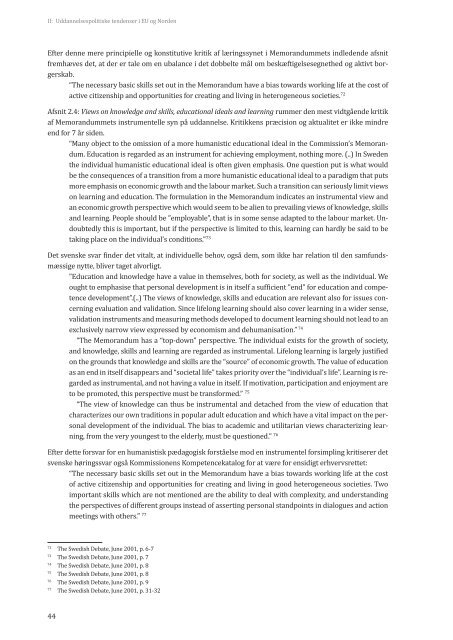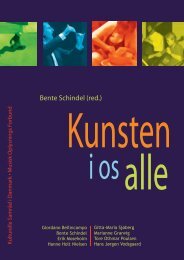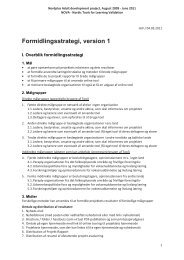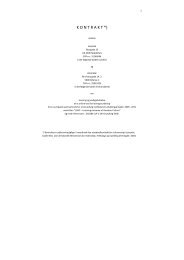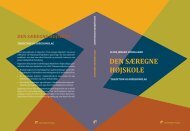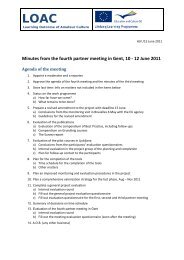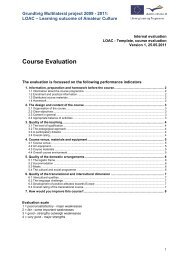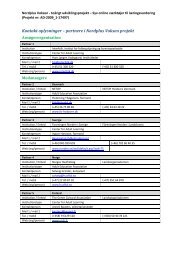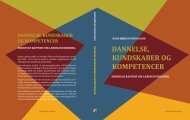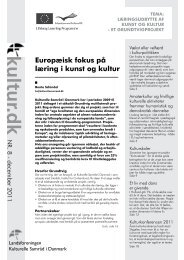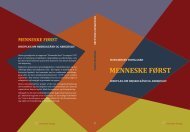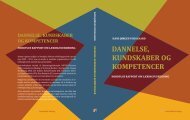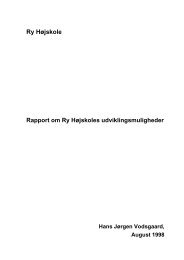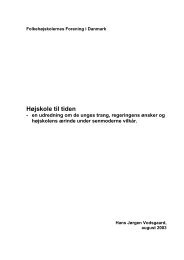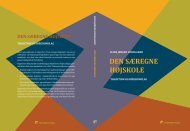Da dannelsen gik ud - Interfolk
Da dannelsen gik ud - Interfolk
Da dannelsen gik ud - Interfolk
You also want an ePaper? Increase the reach of your titles
YUMPU automatically turns print PDFs into web optimized ePapers that Google loves.
II: Uddannelsespolitiske tendenser i EU og Norden<br />
Efter denne mere principielle og konstitutive kritik af læringssynet i Memorandummets indledende afsnit<br />
fremhæves det, at der er tale om en ubalance i det dobbelte mål om beskæftigelsesegnethed og aktivt borgerskab.<br />
“The necessary basic skills set out in the Memorandum have a bias towards working life at the cost of<br />
active citizenship and opportunities for creating and living in heterogeneous societies. 72<br />
Afsnit 2.4: Views on knowledge and skills, educational ideals and learning rummer den mest vidtgående kritik<br />
af Memorandummets instrumentelle syn på <strong>ud</strong>dannelse. Kritikkens præcision og aktualitet er ikke mindre<br />
end for 7 år siden.<br />
“Many object to the omission of a more humanistic educational ideal in the Commission’s Memorandum.<br />
Education is regarded as an instrument for achieving employment, nothing more. (..) In Sweden<br />
the individual humanistic educational ideal is often given emphasis. One question put is what would<br />
be the consequences of a transition from a more humanistic educational ideal to a paradigm that puts<br />
more emphasis on economic growth and the labour market. Such a transition can seriously limit views<br />
on learning and education. The formulation in the Memorandum indicates an instrumental view and<br />
an economic growth perspective which would seem to be alien to prevailing views of knowledge, skills<br />
and learning. People should be ”employable”, that is in some sense adapted to the labour market. Undoubtedly<br />
this is important, but if the perspective is limited to this, learning can hardly be said to be<br />
taking place on the individual’s conditions.” 73<br />
Det svenske svar finder det vitalt, at individuelle behov, også dem, som ikke har relation til den samfundsmæssige<br />
nytte, bliver taget alvorligt.<br />
”Education and knowledge have a value in themselves, both for society, as well as the individual. We<br />
ought to emphasise that personal development is in itself a sufficient ”end” for education and competence<br />
development”.(..) The views of knowledge, skills and education are relevant also for issues concerning<br />
evaluation and validation. Since lifelong learning should also cover learning in a wider sense,<br />
validation instruments and measuring methods developed to document learning should not lead to an<br />
exclusively narrow view expressed by economism and dehumanisation.” 74<br />
“The Memorandum has a “top-down” perspective. The individual exists for the growth of society,<br />
and knowledge, skills and learning are regarded as instrumental. Lifelong learning is largely justified<br />
on the grounds that knowledge and skills are the “source” of economic growth. The value of education<br />
as an end in itself disappears and “societal life” takes priority over the “individual’s life”. Learning is regarded<br />
as instrumental, and not having a value in itself. If motivation, participation and enjoyment are<br />
to be promoted, this perspective must be transformed.” 75<br />
“The view of knowledge can thus be instrumental and detached from the view of education that<br />
characterizes our own traditions in popular adult education and which have a vital impact on the personal<br />
development of the individual. The bias to academic and utilitarian views characterizing learning,<br />
from the very youngest to the elderly, must be questioned.” 76<br />
Efter dette forsvar for en humanistisk pædagogisk forståelse mod en instrumentel forsimpling kritiserer det<br />
svenske høringssvar også Kommissionens Kompetencekatalog for at være for ensidigt erhvervsrettet:<br />
“The necessary basic skills set out in the Memorandum have a bias towards working life at the cost<br />
of active citizenship and opportunities for creating and living in good heterogeneous societies. Two<br />
important skills which are not mentioned are the ability to deal with complexity, and understanding<br />
the perspectives of different groups instead of asserting personal standpoints in dialogues and action<br />
meetings with others.” 77<br />
72 The Swedish Debate, June 2001, p. 6-7<br />
73 The Swedish Debate, June 2001, p. 7<br />
74 The Swedish Debate, June 2001, p. 8<br />
75 The Swedish Debate, June 2001, p. 8<br />
76 The Swedish Debate, June 2001, p. 9<br />
77 The Swedish Debate, June 2001, p. 31-32<br />
44


